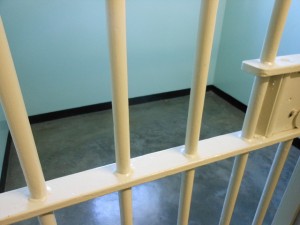Division of Labor: Out of Prison, Out of Work
While much of the country struggles with job creation, D.C. is in the unique position of having more jobs than residents. So why are some D.C. neighborhoods facing Depression-era unemployment rates? DCentric examines how D.C.’s healthy economy has left out so many Washingtonians and what some are doing to close the unemployment gap. Third in a series.

Michael Coghlan / Flickr
Like many young people, Clarence Burrell started following in his father’s footsteps.
The problem? His father was a well-known drug dealer who went to prison, Burrell said.
Burrell, 26, was arrested three times and served a total of nine months in prison for drug-related charges.
“I had been living hard for a long time,” the Ward 8 resident said recently. “I decided not to [keep going] down the route my father went down. I was always thinking about having better, doing better.”
He was released from prison more than five years ago and started looking for jobs. But Burrell, who has some college credits, said he couldn’t even get hired by fast food restaurants because of his criminal record.
Getting hired with a past conviction is a challenge faced by thousands in the nation’s capital. Almost half of the former inmates surveyed in a new Council for Court Excellence report are unemployed. Nearly 60,000 D.C. residents, about 10 percent of the population, have criminal records, making joblessness among former inmates a contributing factor to high unemployment.

Image: Carrie Moskal / DCentric
"Division of Labor" is DCentric's examination of D.C.'s unemployment disparity.
Half of the 8,000 people who return to D.C. from prison every year are back behind bars within three years. According to the Court Excellence report, having a job greatly reduces the chances that former inmates will recommit crimes.
“If we can reduce [the rate of returning to prison], we can increase public safety,” said At-large City Councilman Phil Mendelson, who chairs the Public Safety and the Judiciary committee.
There’s also a cost to the city. As of 2001, about $22,650 a year was spent per inmate incarcerated in a federal prison, which is where D.C. felons are kept.
“I hope we get past this idea of what seems to be the right thing to do. This is the smart thing to do,” said Mike Curtin, who leads D.C. Central Kitchen, an employer of former inmates. “It’s about keeping an open mind and it’s about the future economic survival of our city.”
Getting Hired with a Criminal Record
Some former inmates who get jobs are hired because individual employers want to help them. That was the case for Courtney Stewart, who was released in 1985. An ex-cop gave him a job in a restaurant, but he was still trying to overcome drug addiction and other issues, Stewart said.
“I solved my income problem, but then I had to look at all this other stuff,” he said. “Jail is like college; you learn so many bad things to do while you’re there, so you pick up a lot of bad habits. It took me some time to get all that stuff out of my system.”
Stewart eventually cleaned up and began helping other former inmates. He hires the formerly imprisoned for his cleaning business and runs the Reentry Network for Returning Citizens. He said getting a former inmate a job is part of the solution; Stewart’s organization takes a “holistic approach,” and offers mentoring and other services.
Stewart said many of former inmates he works with spend nine months to two years searching for jobs before getting hired. The hospitality, transportation and construction industries are most likely to hire people with criminal records, according to the Court Excellence report and nonprofit organizers such as Curtin.
But a majority of D.C.’s jobs aren’t in those industries, and even getting a restaurant or construction job through formal channels can be difficult for former offenders. That’s why John Henry, a native Washingtonian with a criminal record, spends his mornings searching for temporary work alongside immigrant day laborers in the Northeast D.C. Home Depot parking lot. Getting hired for a day to put up dry wall doesn’t require a background check.
Many employers in the city have no written policy on hiring former inmates, but they should, according to the Court Excellence report.
Curtin has had positive experiences with his staff; about half are former inmates. “They have a greater understanding of the value of a job,” he said.
Can City Policy Help?
One way to tackle high unemployment among former inmates is by banning hiring bias. Ward 8 City Councilman Marion Barry is exploring reviving a past proposal to prohibit employers from asking about past convictions before a job offer has been made.
“The idea of the criminal justice system is they send you to jail for rehabilitation and punishment, and once you have served your time, it seems to me, your debt has been paid to society,” Barry told The Washington Post.
But not everyone agrees with that approach. The Court Excellence report recommends issuing certificates of good standing to former inmates who complete the terms of their incarceration. Such a certificate could be useful in job searches.
“For ex-offenders, there are some circumstances where discrimination is appropriate. You don’t want to have a convicted rapist to be the maintenance guy in an apartment building,” Mendelson said, adding that there are instances in which former inmates are good hires for businesses.
Some advocate for a more nuanced approach to hiring: For instance, employers often ask whether an applicant has been convicted of a felony without asking the nature of the crime.
“It doesn’t get into violent and non-violent,” said Peter Willner, one of the report’s authors. “[Employers] are using it as a screening mechanism.”
Employers are often hesitant to hire former inmates because of the liability, D.C. Chamber of Commerce President Barbara Lang said. A business could be sued for negligent hiring if something happens involving an employee with a criminal record. If the city allowed businesses to have liability protection, that would help level playing field between those with and without criminal records, the Court Excellence report recommends.
Stewart said he understands why employers are wary about hiring people with criminal records.
“Most people don’t want to take that risk, but they don’t understand that risk,” he said. “It varies [from] individual to individual.”
The Next Generation
Finding employment for former offenders who are parents can be one way of preventing their children from falling into a life of crime. Curtin recalled the story of one of his employees who had been imprisoned for 23 years. His father had been incarcerated as well, and his mother was a drug addict.
Read More:
Explaining D.C.’s Unemployment Disparities
The Gap Between Skills and Jobs
Immigration and D.C. Unemployment
“When he was 10 he had an expectation that if, if he was alive at 21, he’d be in prison,” Curtin recalled. Now, he works for D.C. Central Kitchen and supports his family on his wages.
In Burrell’s case, many of the people he grew up around were involved with crime. People recognized him on the street because of his father.
“Growing up, I got introduced to all of the major drug dealers in the neighborhood,” he said. “That was the norm.”
Now Burrell does administrative work and teaches classes as Southeast Ministry, a Ward 8 nonprofit, where he’s creating a new kind of norm. But the path to good, steady employment hasn’t been easy.
“The only times I got employed is if they sought me out, if it was through somebody I knew [who] got me in the door,” he said. Otherwise, “I don’t see somebody just hiring me.”
-
Brimstone
-
S Riter
-
http://dcentric.wamu.org/ Elahe Izadi
-
http://profile.yahoo.com/6CIDWKBTNDW24JYORV2CEPRMWU Cee Mee




